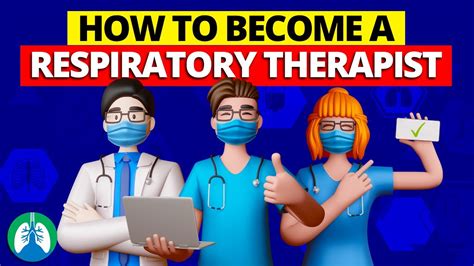Respiratory therapy technicians play a vital role in the healthcare system, providing essential care and support to patients with breathing disorders. As a respiratory therapy tech, you will have the opportunity to work in a dynamic and rewarding field, making a difference in the lives of patients and their families. In this article, we will explore the career path of a respiratory therapy tech, including the job requirements, educational pathway, and career outlook.
What is a Respiratory Therapy Technician?
A respiratory therapy technician, also known as a respiratory therapist or respiratory care practitioner, is a healthcare professional who specializes in the care and management of patients with breathing disorders. Respiratory therapy technicians work under the supervision of licensed respiratory therapists and physicians to provide a range of services, including respiratory care, patient assessment, and treatment.
Key Responsibilities of a Respiratory Therapy Technician
As a respiratory therapy technician, your key responsibilities will include:
- Conducting patient assessments and creating treatment plans
- Administering oxygen therapy and other respiratory treatments
- Operating and maintaining respiratory equipment, such as ventilators and nebulizers
- Monitoring patient vital signs and responding to emergencies
- Providing patient education and support
- Collaborating with healthcare teams to develop and implement care plans

Becoming a Respiratory Therapy Technician: Educational Pathway
To become a respiratory therapy technician, you will need to complete a post-secondary educational program in respiratory therapy. Here are the typical educational requirements:
- Earn an associate's degree or certificate in respiratory therapy from a community college or vocational school
- Complete a program accredited by the Commission on Accreditation for Respiratory Care (CoARC)
- Take courses in respiratory therapy, anatomy, physiology, and pharmacology
- Gain practical experience through clinical rotations and internships
Certification and Licensure
While certification and licensure requirements vary by state, most employers require respiratory therapy technicians to obtain certification from the National Board for Respiratory Care (NBRC). The NBRC offers two levels of certification:
- Certified Respiratory Therapist (CRT)
- Registered Respiratory Therapist (RRT)
Certification demonstrates your expertise and commitment to the field, and can enhance your job prospects and career advancement opportunities.

Job Outlook and Career Advancement Opportunities
The job outlook for respiratory therapy technicians is excellent, with the Bureau of Labor Statistics (BLS) predicting a 21% growth in employment opportunities from 2020 to 2030. This growth is driven by an aging population, an increase in chronic respiratory diseases, and advances in medical technology.
As a respiratory therapy technician, you can advance your career by:
- Obtaining specialized certifications, such as pediatric or critical care certification
- Pursuing a bachelor's degree in respiratory therapy or a related field
- Moving into leadership or management roles
- Specializing in a particular area, such as sleep therapy or pulmonary rehabilitation
Salary and Benefits
The salary range for respiratory therapy technicians varies depending on location, experience, and employer. According to the BLS, the median annual salary for respiratory therapy technicians was $62,810 in May 2020. Benefits may include:
- Health insurance
- Paid time off
- Retirement plans
- Professional development opportunities

Skills and Qualities Required
To succeed as a respiratory therapy technician, you will need:
- Strong communication and interpersonal skills
- Ability to work effectively in a team environment
- Compassion and empathy for patients and families
- Analytical and problem-solving skills
- Ability to maintain accurate records and reports
- Physical stamina to lift and move equipment
Personal Satisfaction and Reward
As a respiratory therapy technician, you will have the opportunity to make a positive impact on patients' lives, providing essential care and support during challenging times. This rewarding career can bring personal satisfaction and fulfillment, as you:
- Help patients breathe easier and improve their quality of life
- Work in a dynamic and fast-paced environment
- Collaborate with healthcare teams to develop and implement care plans
- Continuously learn and grow in your profession

Conclusion
Becoming a respiratory therapy technician can be a rewarding and challenging career path. With the right education, training, and skills, you can make a difference in the lives of patients and their families. If you are passionate about healthcare and want to work in a dynamic and fast-paced environment, consider pursuing a career as a respiratory therapy technician.
Call to Action
If you are interested in learning more about this exciting career, research local educational programs and job opportunities in your area. Reach out to professionals in the field and ask about their experiences and advice. Take the first step towards a rewarding and fulfilling career as a respiratory therapy technician.





What is the typical salary range for a respiratory therapy technician?
+The median annual salary for respiratory therapy technicians was $62,810 in May 2020, according to the Bureau of Labor Statistics.
What are the educational requirements for a respiratory therapy technician?
+A respiratory therapy technician typically requires an associate's degree or certificate in respiratory therapy from a community college or vocational school.
What are the key responsibilities of a respiratory therapy technician?
+Key responsibilities include conducting patient assessments, administering oxygen therapy and other respiratory treatments, operating and maintaining respiratory equipment, and providing patient education and support.
